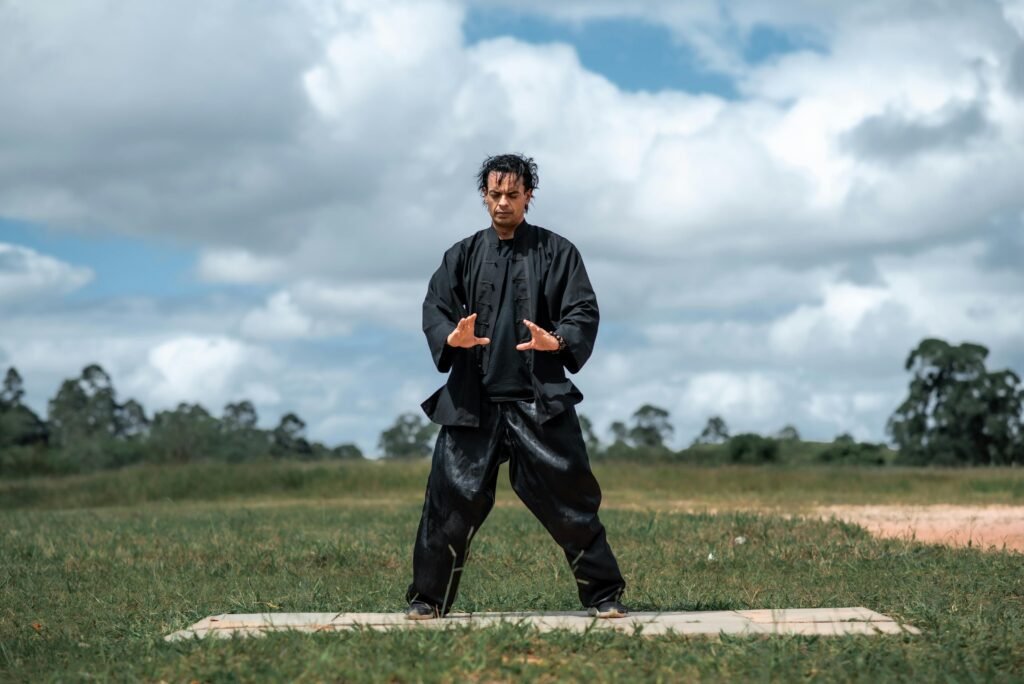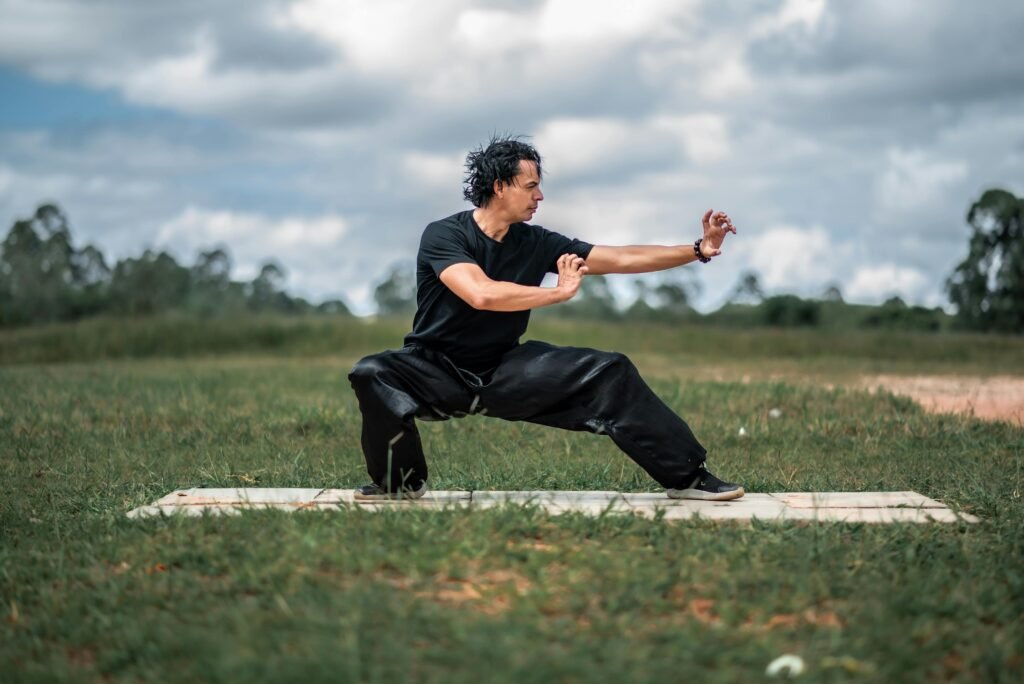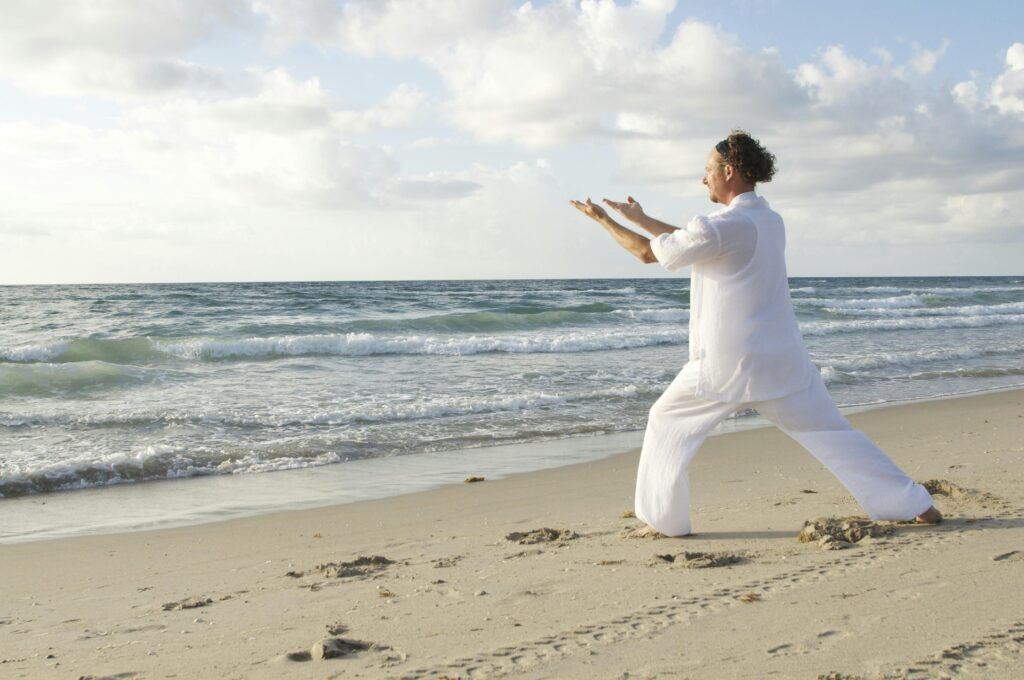Tai Chi: A Gentle Path to Physical and Mental Well-Being
Tai Chi, an ancient Chinese martial art, is much more than just a form of exercise. It’s a practice that harmonizes the body, mind, and spirit, offering a gentle path to physical and mental well-being. Often referred to as “meditation in motion,” Tai Chi involves slow, flowing movements combined with deep breathing, making it an ideal practice for enhancing both physical health and emotional balance.
1. What is Tai Chi? A Mind-Body Practice for Modern Living
Tai Chi is a deeply transformative form of exercise that blends slow, flowing movements with focused breathing and mental concentration. Often referred to as “meditation in motion,” Tai Chi not only strengthens the body but also calms the mind, creating a unique balance between physical and mental well-being. Rooted in the ancient traditions of Traditional Chinese Medicine (TCM), Tai Chi is designed to harmonize the body’s Qi (life energy) by enhancing its flow through the body’s energy channels. This balance between body, mind, and spirit helps to promote vitality, reduce stress, and improve overall health. In today’s fast-paced world, Tai Chi offers a peaceful, low-impact way to reconnect with your body and mind, making it an ideal practice for people of all ages seeking a holistic approach to health and wellness.

References:
- “Start your Tai Chi journey with a beginner’s guide like the Tai Chi for Beginners DVD by Dr. Paul Lam.”
Supplement suggestions:
- “Support relaxation with a calming herbal tea like Traditional Medicinals Organic Chamomile Tea.”
Recommended Course:
- “Learn the basics of Tai Chi with the Tai Chi for Beginners Course on Udemy.”
2. The Benefits of Tai Chi
Enhances Physical Health: Tai Chi is a low-impact exercise that promotes balance, flexibility, and overall physical well-being. It strengthens muscles, improves joint mobility, and boosts cardiovascular health without putting strain on the body.
Improves Mental Clarity: The mindful movements of Tai Chi require concentration and focus, helping to clear the mind and reduce mental clutter. It enhances mental clarity and fosters a sense of calm and tranquility.
Promotes Emotional Balance: As a meditative practice, Tai Chi also supports emotional health by reducing stress and anxiety. The flowing movements, combined with deep breathing, encourage relaxation and emotional stability.
Supports Energy Flow: Tai Chi is based on the concept of Qi, or life energy, which flows through the body. By practicing Tai Chi, you improve the flow of energy, promoting physical vitality and emotional well-being.

References:
- “Try the YogaDirect Tai Chi Mat for a comfortable surface to practice on.”
Supplement suggestions:
- “Promote relaxation with a magnesium supplement like Natural Vitality Calm.”
Recommended Course:
- “Explore the Tai Chi for Stress Relief Course on Mindbodygreen to learn techniques for calming the mind.”
3. Tai Chi for Stress Relief and Mental Wellness
In today’s fast-paced world, stress has become an all-too-common issue for many people, affecting both mental and physical health. Tai Chi for stress relief offers a holistic approach to combating this widespread problem. This ancient practice emphasizes mindfulness, deep breathing, and slow, intentional movements, making it an effective tool for reducing stress and promoting overall mental wellness.
By focusing on the present moment and synchronizing your movements with breath, Tai Chi helps activate the parasympathetic nervous system—the part of the body responsible for promoting relaxation and reducing the fight-or-flight response. This process helps to lower cortisol levels, the stress hormone, while also enhancing mood and emotional balance. The gentle, flowing movements encourage a sense of calm and tranquility, allowing the mind to quiet and the body to release tension.
For those searching for natural and non-invasive ways to manage stress, Tai Chi provides an ideal solution. Unlike other forms of exercise that may cause further strain on the body or mind, Tai Chi offers a low-impact practice that is accessible for people of all ages and fitness levels. Regular practice can foster mental clarity, emotional resilience, and a profound sense of well-being.

References:
- “Create a calming space for Tai Chi with an essential oil diffuser like the [URPOWER Essential Oil Diffuser.”
Supplement suggestions:
- “Support relaxation with a stress-relief supplement like Olly Goodbye Stress Gummies.”
Recommended Course:
- “Join the Tai Chi for Mental Wellness Course on Gaia to learn specific techniques for stress relief.”
4. Tai Chi for Physical Health: Balance, Strength, and Flexibility
Tai Chi is an excellent practice for improving physical health, particularly for older adults or individuals recovering from injury. The slow, controlled movements help enhance balance, increase strength, and improve flexibility in a safe and low-impact manner. As a full-body exercise, Tai Chi engages the muscles, joints, and tendons without placing unnecessary strain on the body, making it ideal for those with joint issues or chronic conditions.
The focus on balance in Tai Chi is particularly beneficial for reducing the risk of falls, a common concern for older adults. The gentle, deliberate movements help strengthen stabilizing muscles and improve coordination, leading to better posture and overall body alignment. Additionally, Tai Chi helps enhance joint mobility, making it easier to perform daily activities without discomfort.
As you age, staying active and mobile is key to maintaining your independence and overall well-being. Tai Chi offers a safe and effective option for those looking to stay fit, flexible, and agile, without the risks associated with high-impact exercises. Whether you’re looking to recover from an injury or maintain your mobility as you age, Tai Chi is a fantastic way to support your body’s physical health and vitality.

References:
- “Enhance your practice with a Tai Chi instructional book like The Harvard Medical School Guide to Tai Chi.”
Supplement suggestions:
- “Support joint health with a collagen supplement like Vital Proteins Collagen Peptides.”
Recommended Course:
- “Learn how to improve balance and strength with the Tai Chi for Seniors Course on Udemy.”
5. How to Get Started with Tai Chi: A Simple Guide for Beginners
Getting started with Tai Chi is easy, and the beauty of this practice lies in its simplicity—no special equipment or prior experience is necessary. Tai Chi is accessible to people of all ages and fitness levels, making it an ideal practice for anyone looking to improve balance, strength, and mental wellness. Here are some helpful tips to begin your Tai Chi journey:
1. Find a Class
If you’re new to Tai Chi, one of the best ways to start is by joining a Tai Chi class. Look for classes offered at community centers, gyms, or wellness studios in your area. In-person classes give you the opportunity to learn proper techniques and get personalized feedback from an experienced instructor. Many instructors also offer beginner-friendly sessions, making it easy to ease into the practice.
2. Practice at Home
If you prefer learning at your own pace, you can also begin practicing Tai Chi at home. There are plenty of online Tai Chi videos and DVDs that guide you through the basic movements and routines. Starting with short, simple sessions can help you gradually get familiar with the techniques and build confidence. As you become more comfortable, you can increase the duration and complexity of your practice.
3. Start Slow
Tai Chi is all about slow, deliberate movements. Begin with short sessions (10-15 minutes) and gradually increase the time as you get more comfortable with the movements. Starting slow helps you focus on form, balance, and mindfulness without feeling overwhelmed. Over time, you’ll notice improvements in your flexibility, strength, and mental clarity.
4. Focus on Breath
One of the most important aspects of Tai Chi is coordinating movement with breath. Deep, slow breathing enhances relaxation and mindfulness, allowing you to be more present in your practice. As you move through the forms, focus on your breath, allowing it to guide your actions and promote a sense of calm and well-being.
5. Consistency is Key
The key to success in Tai Chi is consistent practice. Make it a part of your daily routine, even if it’s just for a few minutes each day. Over time, you’ll begin to notice improvements in your physical health, mental wellness, and overall sense of balance.

References:
- “Try the BodyWisdom Tai Chi for Beginners DVD for easy-to-follow instructions.”
Supplement suggestions:
- “Support your energy levels with a plant-based protein powder like Garden of Life Sport Organic Plant-Based Protein.”
Recommended Course:
- “Join the Tai Chi for Beginners Course on Udemy to learn step-by-step techniques.”
Conclusion
Tai Chi is a gentle yet powerful practice that offers numerous benefits for physical, mental, and emotional health. By incorporating Tai Chi into your daily routine, you can reduce stress, improve balance, and enhance overall well-being. Whether you’re new to Tai Chi or looking to deepen your practice, this ancient art provides a holistic path to health that aligns perfectly with modern wellness trends.
Call to Action:
“Ready to experience the benefits of Tai Chi? Explore our top-rated books, courses, and tools here and start your journey to better health today!”
FAQ
1. Is Tai Chi suitable for beginners?
Yes, Tai Chi is highly beginner-friendly and can be adapted to all fitness levels. Its slow, controlled movements make it easy to learn and practice, and it’s a gentle way to improve flexibility, balance, and overall well-being. Whether you’re new to exercise or looking for a low-impact activity, Tai Chi is an excellent choice.
2. How often should I practice Tai Chi?
For beginners, aim for 2-3 sessions per week to start, gradually increasing the duration and frequency as you become more comfortable with the movements. Consistency is key to seeing improvement, so try to incorporate it into your routine. Even short sessions (10-15 minutes) can offer benefits for balance, strength, and mental clarity.
3. Can Tai Chi help with chronic pain?
Yes, Tai Chi for chronic pain is a proven practice that can significantly improve flexibility and reduce pain, especially in conditions like arthritis. The gentle, low-impact movements of Tai Chi help ease muscle tension, improve joint mobility, and alleviate discomfort without placing strain on the body. It’s a safe and natural way to manage chronic pain while promoting overall health.
4. Do I need special equipment to practice Tai Chi?
No, Tai Chi requires no special equipment. All you need is comfortable clothing that allows free movement and a quiet, peaceful space to practice. Tai Chi can be practiced anywhere—whether in your living room, a park, or a dedicated wellness studio—making it a convenient and accessible form of exercise.
5. Can Tai Chi improve mental health?
Absolutely! Tai Chi for mental health is widely recognized for its ability to reduce stress, anxiety, and depression. The meditative aspect of Tai Chi encourages deep, mindful breathing and relaxation, helping to calm the mind. Regular practice can also improve focus, enhance emotional balance, and provide a sense of peace and well-being.
Disclaimer
This article is for informational purposes only and is not intended to replace professional medical advice, diagnosis, or treatment. Always consult with a healthcare provider before starting any new exercise or wellness practice, especially if you have pre-existing health conditions. Some links in this article are affiliate links, which means we may earn a small commission if you purchase through them at no extra cost to you. This helps support our work and allows us to continue providing valuable content. Thank you for your support!
